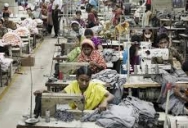
S&Ds call on the European Commission to demand better working conditions in Bangladesh
Date
Tue, 04/24/2018
Sections
Global Europe
Social Europe & Jobs
Justice & Home Affairs
Five years ago, the world watched with great shock at the images of the collapsed clothing factory Rana Plaza in Bangladesh. The European Commission gave the government of Bangladesh a deadline to improve the working conditions and the government ignored this ‘red line’. The European Commission must now demand the government of Bangladesh to take its responsibility and ensure decent working conditions in all fast-fashion chains. The S&D Group urges the European Commission to initiate an investigation into Bangladesh's eligibility for EU trade benefits.
Linda McAvan, chair of the development committee, stated:
“Five years on from the Rana Plaza disaster that took the lives of 1,138 people and we are slowly starting to see progress being made in higher work and safety standards for garment workers. There is still a way to go - trade unionists trying to organise collective action are often at risk, in many instances children who should be in school are still working and in an industry where 90% of employees are women, the gender pay gap remains. To address this we need to continue engaging with the garment industry and the governments to ensure that those who make our clothes have access to the basic working conditions we all take for granted.”
Agnes Jongerius, vice-chair of the employment and social affairs committee, commented:
“Decent working conditions are laid down in International Conventions. The freedom of association and collective bargaining are even human rights. The government of Bangladesh and fast-fashion chains have to take their responsibility. The profits of this industry should be equally divided. Only when the government and fast-fashion chains meet the requirements of international working conditions, living wages and respect human rights, can the withdrawal of trade benefits to the European Union be prevented.
Arne Lietz, member of foreign affairs and development committees, added:
“One year has passed since the European Parliament had adopted the initiative report on the flagship initiative in the garment sector, and the Commission hasn’t delivered yet. We expect at least little steps, like the establishment of a European Multi-Stakeholder Platform to start this year. This could be the first step to our main goal - a profound and binding European legislation on the garment supply chain.”
Agenda
Tue, 03/10/2026 - 10:00

